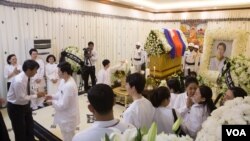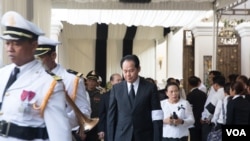In the wake of the death on Wednesday of ruling Cambodian People’s Party stalwart Sok An, a deputy prime minister, the party said it was “not shaky” and that his death would not provoke any “security concerns” amid speculation of a power struggle.
Sok An, known as the “minister of many arms,” was a close ally of Prime Minister Hun Sen since the 1980s and served for almost four decades in post-Khmer Rouge governments. He died in a hospital in Beijing at 6.32 pm on Wednesday, according to the CPP sources. He was 66.
Sok Eysan, CPP spokesman, said that the party had lost a valuable leader, adding that despite An’s central role in CPP politics the party had many up-and-coming officials who could replace him.
“The CPP is strong and unified; the storm cannot make the party shaky,” he said.
Sok An was one of 10 deputy prime ministers, the minister for Hun Sen’s cabinet, the Council of Ministers, and had led numerous government committees, agencies and commissions since 2004.
A former teacher, An’s close relationship with Hun Sen was cemented with the wedding of his eldest son and Hun Sen’s second daughter, Hun Maly.
“The CPP leadership is collective. When Samdech Sok An was alive and led, he did not decide anything on his own. He made collective decisions,” Eysan said.
Chheang Vun, a ruling party lawmaker, said he considered An a “brother” who had contributed a great deal to the development of the nation and was an “honest colleague”.
“We lost an important hero of the party,” he said.
“We have prepared a successor,” he added, without elaborating.
Another CPP lawmaker, Pen Panha, said any successor to An would have big shoes to fill.
An’s death came at a tense time for the CPP and Cambodia, with commune elections scheduled for June and general elections drawing close.
Hun Sen, who has held power for more than three decades, has been criticized for attempting to silence all dissent ahead of the polls.
Phay Siphan, government spokesman, said Bin Chhin, another deputy prime minister and the head of the body charged with resolving land disputes, would temporarily assume An’s duties.
“There is nothing happening apart from the continuance of normal administration and there are no concerns about national security,” he said.
Siphan added that An was “the right person with a lot of experience” to take on the large workload he assumed.
An’s career was not without controversy. He began to work closely with Hun Sen after the fall of the Khmer Rouge when Hun Sen was foreign minister. He was central to the peace talks that led to the signing of the Paris Peace Agreement in 1991 and in the late 1990s had spearheaded the formation of the Khmer Rouge tribunal.
He has come under fire for alleged nepotism as his sons have received promotions and lucrative positions in the foreign ministry, Apsara Authority, the Cambodia Rice Federation and parliament.
The CPP has defended the family, saying An’s sons had the experience and skills needed to fill the roles.










